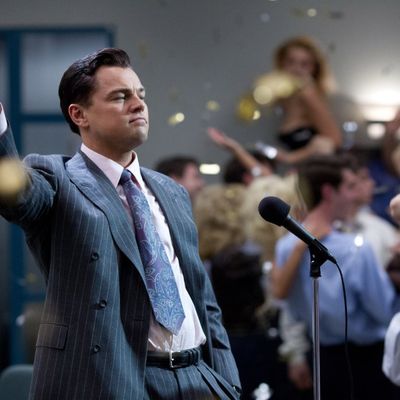
In The Wolf of Wall Street, Martin Scorsese continues his worship of masculine energy: energy for its own sake, energy as a means of actualizing the self, energy because there’s nothing worse in Scorsese’s cosmos than passivity, which inevitably translates as impotence. But what happens in a movie when that energy is willfully indiscriminate — shapeless, conscienceless, mindless? It becomes an endurance test.
Scorsese’s youngish alter ego Leonardo DiCaprio is the real-life penny stockbroker Jordan Belfort, who delivers boastful odes (in voice-over and sometimes right to the camera) to the accumulation of cash, sex, drugs, and real estate. Working from Belfort’s memoir (the script is by Terence Winter), Scorsese tells the story entirely from his protagonist’s point of view, evidently grooving on Belfort’s conspicuous consumption and ability to live — at least for a time — by his own laws. Maybe a quarter of the movie’s three hours centers on Belfort’s attempt to hide his chicanery (and money) from an FBI agent named Denham (Kyle Chandler). The rest is a veritable orgy of immorality, each scene making the same point only more and more outrageously, the action edited with Scorsese’s usual manic exuberance but to oh-so-monotonous effect.
The trajectory is nothing you haven’t seen before. Young, wide-eyed (too wide-eyed) Belfort arrives on Wall Street and is told he’s “pond scum” by one of his new bosses. The other (Matthew McConaughey) takes him out to lunch, sucks down drink after drink, repeatedly thumps his chest, and says, “Fuck the clients!” Money, cocaine, and hookers — that’s what it’s about. Deep-sixed after 1987’s Black Monday, Belfort starts over on Long Island in penny stocks and puts that “fuck the clients” philosophy into action by selling “garbage to garbagemen.” (“Their money was better off in my pocket!”) Before long, he, too, has cocaine and hookers — at one point sucking the former from the ass of the latter. And so begins the symphony of sin.
Scorsese seems to think that by blowing Belfort’s book up to three hours he’s making an epic statement. But it’s not as if he shows you the consequences of Belfort’s actions. The movie has no scope; there’s barely enough content for a short. The Wolf of Wall Street is three hours of horrible people doing horrible things and admitting to being horrible. But you’re supposed to envy them anyway, because the alternative is working at McDonald’s and riding the subway alongside wage slaves. What are a few years in a minimum-security prison — practically a country club — when you can have the best of everything?
In interviews, Scorsese’s brilliant editor Thelma Schoonmaker has said it was hard to cut the film down from four hours. Four hours?! As I watched, I kept thinking that every scene could be snipped at the halfway point, before yet another hot-dog monologue or leering shot of Belfort’s second wife, the startlingly pretty but soulless Naomi, the “Duchess of Bay Ridge,” played by Margot Robbie. I figured Leo must have been sitting in the editing room saying, “No, no, don’t cut here — my favorite line is coming up — 30 more seconds — okay, a minute — wait, let it run! It’s my Oscars scene!” But no, this was Scorsese’s design. Overkill is the ruling aesthetic.
DiCaprio certainly aims to kill. He has A-list charisma, but his performance is all on the nose — no shading. Jonah Hill sticks big false teeth into his mouth to play Donnie, Belfort’s zhlubby sidekick — the dork engorged by power and quickly more brazen than his mentor. Those choppers chew the scenery, but Hill has a good, quiet moment when Belfort’s fortunes plummet and Donnie doesn’t know how to talk to him. As the FBI nemesis, Chandler steals the picture by underplaying. The only scene with a dramatic arc is onboard Belfort’s yacht, when Denham and his partner pay a call. Belfort delivers a spiel in which he hints he can make their lives more comfortable, and they sit and listen patiently and give him the tiniest friendly signals to keep talking — and hang himself.
Scorsese’s go-with-the-immoral-flow strategy makes sense in one respect. The parts of Oliver Stone’s Wall Street that captured our imagination featured the dastardly Gordon Gekko: Who even remembers the “good father,” a tediously moralizing union man played by Martin Sheen? Why should a filmmaker slow down a movie with sermons saying things we already know?
Obviously, he or she shouldn’t — that clumsily. But much of what we respond to in a work of art is the distance between the artist and the subject. It can be the subtlest tension between the filmmaker’s and characters’ points of view, as in Scorsese’s Taxi Driver, where we’re infected by Travis Bickle’s insanity but could also stand back from it, or GoodFellas, where the narrator’s newfound sense of power wasn’t enough to forestall the dread. To make The Wolf of Wall Street, Scorsese has had to empty out his head and pound his chest. The movie is thumpingly insipid.


